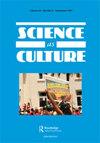‘Shade trees for the next generation’: constructing the promissory publics of prospective cohort studies
IF 2.4
3区 哲学
Q1 CULTURAL STUDIES
引用次数: 0
Abstract
Epidemiological cohort studies are a central research design in public health which appeal to, and can reinforce, specific ideas of the nation, sociality and the ‘good’ citizen. The concept of publics, the sociology of expectations and a co-productionist framework provide the theoretical frame to investigate how popular representations of two cohort studies, German National Cohort and UK Biobank, attempt to enrol a concerned public. By constructing promissory publics, cohort studies produce morally charged visions of health research and civic engagement as normative social practices. Promissory publics straddle the population and the citizen, the nation and the region, the future and the past, thus adding nuance to existing conceptual approaches. The publics of cohort studies are bolstered by the care practices of predominantly female staff, functioning as a performance of social recognition in lieu of an immediate beneficiary of research participation. Through these processes, popular representations of cohort studies intervene into much broacher visions of society and its anticipated futures, co-producing socially dominant and morally charged projections of sociality as well as health. The production of such publics thereby draws boundaries between members of the public and those practices enacted as endangering civic values. As such, cohort studies may have much broader socio-cultural ramifications that could reinforce old or reintroduce new lines of inclusion or exclusion.“下一代遮荫树”:构建前瞻性队列研究的预期公众
流行病学队列研究是公共卫生领域的一项核心研究设计,它吸引并能够加强国家、社会和“好”公民的具体观念。公众概念、期望社会学和共同生产主义框架提供了理论框架,以研究德国国家队列和英国生物银行这两个队列研究的流行代表如何试图吸引关注的公众。通过构建期许公众,队列研究产生了道德的健康研究和公民参与作为规范的社会实践的愿景。期许公众跨越了人口和公民、国家和地区、未来和过去,从而增加了现有概念方法的细微差别。以女性为主的工作人员的护理做法支持了队列研究的公众,作为一种社会认可的表现,而不是参与研究的直接受益者。通过这些过程,队列研究的流行表现介入了许多关于社会及其预期未来的更大胆的愿景,共同产生了社会主导和道德主导的社会和健康预测。因此,这种公共产品的生产在公众成员和那些被制定为危害公民价值的做法之间划出了界限。因此,队列研究可能具有更广泛的社会文化影响,可以加强旧的或重新引入新的包容或排斥线。
本文章由计算机程序翻译,如有差异,请以英文原文为准。
求助全文
约1分钟内获得全文
求助全文
来源期刊

Science As Culture
Multiple-
CiteScore
5.20
自引率
3.80%
发文量
28
期刊介绍:
Our culture is a scientific one, defining what is natural and what is rational. Its values can be seen in what are sought out as facts and made as artefacts, what are designed as processes and products, and what are forged as weapons and filmed as wonders. In our daily experience, power is exercised through expertise, e.g. in science, technology and medicine. Science as Culture explores how all these shape the values which contend for influence over the wider society. Science mediates our cultural experience. It increasingly defines what it is to be a person, through genetics, medicine and information technology. Its values get embodied and naturalized in concepts, techniques, research priorities, gadgets and advertising. Many films, artworks and novels express popular concerns about these developments. In a society where icons of progress are drawn from science, technology and medicine, they are either celebrated or demonised. Often their progress is feared as ’unnatural’, while their critics are labelled ’irrational’. Public concerns are rebuffed by ostensibly value-neutral experts and positivist polemics. Yet the culture of science is open to study like any other culture. Cultural studies analyses the role of expertise throughout society. Many journals address the history, philosophy and social studies of science, its popularisation, and the public understanding of society.
 求助内容:
求助内容: 应助结果提醒方式:
应助结果提醒方式:


